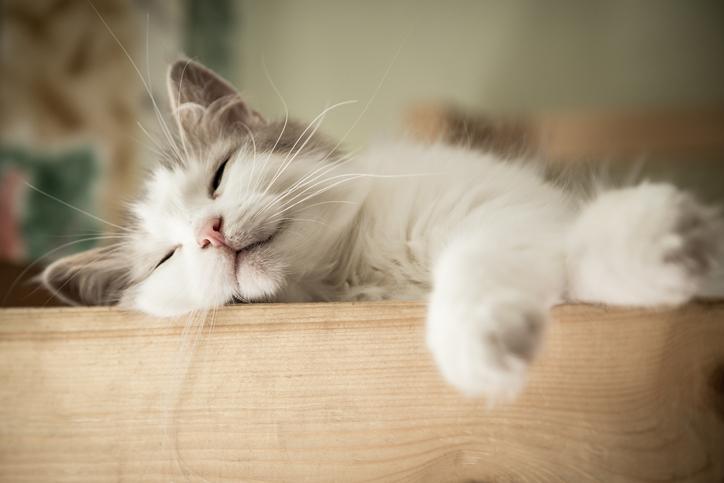Do Cats Have Dreams?



See files for Cats
Cats are almost synonymous with sleep. Although they can be very active and agile, they need to spend the majority of their dat at rest. While asleep, we may see them make noises or movements, something which can lead us to ask if cats can dream? Taking it further, if they can dream, do cats have nightmares?
In this AnimalWised article, we ask do cats have dreams? While we will never be able to ask our cat this question or find out what they dream about, there are ways we can make conclusion over whether cats dream.
How do cats sleep?
If we are trying to find out whether cats have dreams, we need to look at their sleeping habits. Although cats will sleep for many hours during the day, not all sleep is the same. The majority of feline rest is spent in a light sleep, something equivocal to napping in humans. This is important for wild cats as they need to be alert to their surroundings. Domestic cats still maintain this behavior, despite living in less-dangerous environments.
As with humans, cats have different types of sleep. These are generally categorized as the following:
- NREM (non-rapid eye movement): this is the lighter stage (or stages) of sleep which is the equivalent of light sleep or napping.
- REM (rapid eye movement): this is the sleep stage known as deep sleep. While cats will need lighter sleep periods for safety, they will also need deep sleep.
These different phases would alternate throughout the day. When a cat lies down to rest, they begin by falling into a light sleep for approximately half an hour. After this period, they enter a heavier sleep, which is considered deep sleep,. This only lasts about 6-7 minutes. After this period there is a return to a lighter sleep phase that occupies about 30 minutes. They will remain in this sleep until they wake up.
This is the normal sleep cycle of a healthy adult cat. In older or younger individuals, as well as cats with poor health, the sleep stages may present some differences. For example, kittens less than a month old only experience the deep sleep cycle. This lasts a total of about twelve hours out of every 24. After a month, the kittens acquire the sleeping patterns of adult cats.
How much do cats sleep?
Cats are known for being lazy. While this is a value judgement which may be unfair, it is correct to say they felines like to sleep a lot. As with the type of sleep, the duration of a cat's sleeping time will differ according to age, health and other factors. In general, a healthy adult cat will sleep about 16 hours per day. This is around twice as much as the amount of time adult humans require.
In his book on the behavior of cats, the well-known zoologist Desmond Morris proposes a clarifying comparison. According to his calculations, a nine-year-old cat would have been awake for only three years of his life. His hypothesis to explain why this species can spend so much time sleeping throughout their life is related to feline hunting behavior. As cats are such effective hunters, they can catch and eat prey easily, giving them more time to rest.
If our cat suddenly stops playing, interacting and grooming themselves, it is important to differentiate this from regular sleep. This is lethargy likely due to a physical health problem, although emotional trauma can play a part. If your cat is sleeping too much or showing signs of illness, take them to a veterinarian to diagnose the issue.
The climate and weather will also have some bearing on how much a cat sleeps. Take a look at our article on whether cats sleep longer in winter to learn more.

Are cats able to dream?
To understand whether cats dream, we need to better understand their sleep cycles. In humans, we know that dreaming only occurs during the rapid eye movement (REM) stage of sleep. During this state of deep sleep, we relax completely to the point our muscles lose tone. Studies have shown that cats also enter into REM sleep[1]. Their body similarly relaxes completely and eye movement can be seen under their eyelids.
Along with a relaxed physical state and eye movement, we can see other signs the cat may be dreaming in REM. These include twitching movements while sleeping of their ears, limbs and tail. The muscules of the mouth may also activate so they make trembling movements. These may be accompanied by quiet vocalizations such as purring.
Of course, the most characteristic behavior us the movement of the eyes. When REM occurs, we can see the eyeballs moving under the closed or half-open eyelids, while the rest of the body remains relaxed. In some cases, we may notice that the cat wakes up scared, as if coming back from a nightmare, although it will only be momentary.
All these movements are therefore completely normal physiological traits. All cats will do them to a greater or lesser extent. They do not indicate any pathology, nor do we have to intervene to wake up the cat. On the contrary, we must ensure our feline companion places to rest, which must be comfortable, warm and sheltered. What it does tell us is that cats are likely to dream.
What do cats dream?
The plausibility of cats being able to have dreams is related to scientific studies on brain function. Since their brain makes waves similar to a human brain when dreaming, it implies they will be having a similar experience.
Although we can reasonably suggests cats have the ability to dream, science provides no answers as to what they dream. Even with humans, it is hard to know exactly for what REM sleep functions. We know we require sleep to rest and reset certain physiological systems. However, dreams are difficult to qualify.
As with infants, kittens will have longer periods of REM sleep than older cats. This suggests REM, and consequently dreaming, is important for feline development. It is generally understood to help the cat's organism to process what their conscious selves register. This includes internalizing the results of certain stimuli and even developing memory. For this reason, we can presume that adult cats will dream for similar purposes.

Do cats have nightmares?
In line with the above reasoning, we cannot say whether cats have nightmares. Since we cannot tell what type of dream cats have, we cannot confirm their existence. When we see our cat wake up, they may do so with a start. While this may imply they were having a nightmare, it is likely more to do with something suddenly waking them.
Although cats do not have the psychological development of humans, they are animals capable of emotions. They may not be as evolved or complicated as those of humans, but we know they can show signs of both positive and negative emotions. For this reason, it is possible they might have both positive and negative experiences when unconscious.
To know more about what cats may experience when unconscious, take a look at our article on what different cat sleeping positions mean.

If you want to read similar articles to Do Cats Have Dreams?, we recommend you visit our Facts about the animal kingdom category.
1. Márquez-Ruiz, J., & Escudero, M. (2008). Tonic and phasic phenomena underlying eye movements during sleep in the cat. The Journal of Physiology, 586(14), 3461-3477.
https://pubmed.ncbi.nlm.nih.gov/18499729/
- Morris, Desmond. (1986). Observe your cat. Barcelona. Plaza Janés.







